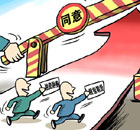Editorials
Facing potential risks
(China Daily)
Updated: 2010-01-26 07:50
 |
Large Medium Small |
Unlike some who have never gained in wit after dropping into a pit of mistakes, the authorities in Shanghai have shown they have at least learned.
Their introduction of a risk evaluation process for major government policies may be a worthy example for those nervous about people's discontent.
Everything has its seed. In quite some recent "mass incidents," the seed turned out to be poorly conceived policies or awkward execution of otherwise harmless policies. So those in Shanghai have come up with the idea of risk appraisals as a pre-warning mechanism. Policy initiatives considered to be potentially destabilizing will be suspended or simply axed. And the possible risks are rated to expedite corresponding responses.
| ||||
Had they been adequately informed about possible negative repercussions, those with the Ministry of Industry and Information Technology would not have so assuredly thrown out the projected "Green Dam" software and sank itself into shame.
Installing a preventative measure in the decision-making process is a pragmatic design to ensure good governance. At least it can filter awkward decisions, like the "Green Dam", and thus avoid further erosion of public confidence in public offices. To avoid possible public discontent, all government policies had better go through such scrutiny.
In spite of the claim that they act on behalf of the public interest, many public offices and officials have developed a mistaken concept that whatever is done in the name of public interest is in its best interest. And some of them share the habit of mistaking their departmental interest for that of society's.
Decisions made that way have the potential to backfire. But somehow the potential risks have never been heeded, until the Internet proved itself a powerful amplifier of public discontent.
Last year, several officials were investigated and removed from their posts after their misconduct was exposed by the Internet and widely discussed throughout the country. Corrupt officials dread the Web precisely because it is too efficient in disseminating information. Therefore some are in favor of controlling information to reduce destabilizing factors for them. We are sure Shanghai's approach will turn out to be more effective, and less costly.
If implemented faithfully, the risk-evaluation process will not only prevent inane decisions from embarrassing the authorities, but more importantly, make local decision-makers more conscious of, and thus concerned about, the real-world consequences of their decisions. And the latter is more essential for refining governance capabilities.
The fact that government policies have become sources of instability is abnormal.
(China Daily 01/26/2010 page8)












